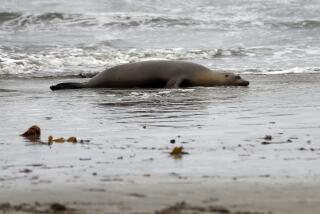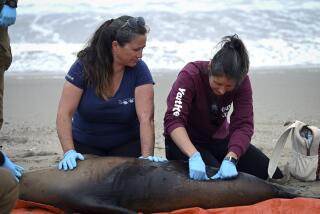SeaWorld uses newspaper ads to strike back at ‘Blackfish’ charges
Facing a mounting public-relations crisis, SeaWorld has finally responded to charges of animal mistreatment made in this year’s documentary “Blackfish.”
On Friday, SeaWorld paid to publish an open letter in eight newspapers, including the Los Angeles Times, emphasizing its care for killer whales. Though the full-page advertisement does not address “Blackfish” by name, the majority of the points made in the letter refute allegations made in the film.
Directed by Gabriela Cowperthwaite, “Blackfish” investigates the death of Dawn Brancheau, a SeaWorld trainer who was killed by an orca named Tilikum during a performance at the theme park in 2010. The documentary explores what may have led Tilikum to attack Brancheau, arguing that whales in captivity become psychologically and physically damaged.
“Blackfish” became a critical darling when it opened at the Sundance Film Festival nearly a year ago, and the film has continued to raise the ire of animal activists and movie lovers. The documentary opened in theaters in July, collecting an impressive $2 million. In October, it premiered on CNN, attracting almost 1.4 million viewers, per Nielsen -- a strong number for the news channel.
Since then hundreds of celebrities have rallied against SeaWorld on social media and eight musical acts -- including Willie Nelson, Barenaked Ladies and Trisha Yearwood -- have canceled shows that had been scheduled at SeaWorld parks.
In an interview with The Times on Friday morning, SeaWorld President and Chief Executive Jim Atchison said the concert cancellations prompted the newspaper campaign.
“Some of the momentum that was building around these concert cancellations -- we wanted to make sure that didn’t gain a voice that didn’t fairly represent the issues,” he said. “This is not a massive investment for us. This is not a massive ad campaign for us. This is a measure of us wanting to make sure we respond to some misconceptions.”
Some of the six bullet points made in the letter assert that “SeaWorld does not capture whales in the wild” and doesn’t “separate killer whale moms and calves.” Similar arguments were presented in a message quietly sent to roughly 50 film critics in July just before the theatrical release of “Blackfish.”
Atchison said SeaWorld tried to persuade the musicians who canceled their appearances to change their minds by “inviting them to tour our parks” and “offering opportunities for them to talk with our people.”
“Sadly and unfortunately,” he added, “ they were really responding to petitions that were driven by an activist agenda. They responded with the notion that it was easier for them to move on and sidestep the attention altogether.”
“Blackfish” is one of 15 films being considered for an Academy Award nomination in the documentary category; the five nominees will be announced Jan. 16.
On Friday, filmmaker Cowperthwaite said she viewed SeaWorld’s new letter as “proof that ‘Blackfish’ woke a 40-year sleeping dragon.”
“Unfortunately, their statements range from wildly misleading to patently false,” she said. “I just wish they would evolve past their 40-year-old spin and resolve to work with us toward a better future.”
The “Blackfish” filmmakers were drafting a rebuttal to SeaWorld’s open letter.
Atchison has never spoken to Cowperthwaite, as SeaWorld, which is owned by the Blackstone Group, declined to participate in “Blackfish.” Asked if he regretted that decision, the executive remained steadfast: “No. Not a bit. From the moment it was getting organized, we knew quite well where it was going.”
More to Read
The biggest entertainment stories
Get our big stories about Hollywood, film, television, music, arts, culture and more right in your inbox as soon as they publish.
You may occasionally receive promotional content from the Los Angeles Times.











